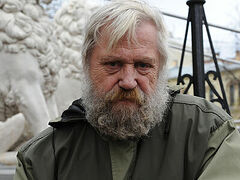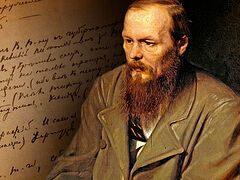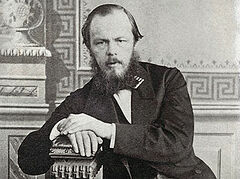Besides being one of the most famous and popular authors in the world, Fyodor Mikhailovich Dostoyevsky is an Orthodox philosopher whose ideas still influence his readers and familiarize them with profound Christian concepts. To commemorate his 200th birthday celebrated in November 2021, we are publishing an interview with Oscar Mauricio Lopez Casillas, a graduate of the Faculty of Philosophy of Universidad Vasco de Quiroga in Mexico. After discovering Dostoyevsky, Oscar became a researcher of his work and converted to Orthodoxy.
—Oscar, do people know and read Fyodor Mikhailovich Dostoyevsky in your country?
 Oscar Mauricio Lopez Casillas —First, I’d like to thank you for giving me an opportunity to talk about Fyodor Mikhailovich Dostoyevsky, as he is my favorite author! It is especially important for me considering that las month celebrated his 200th birthday.
Oscar Mauricio Lopez Casillas —First, I’d like to thank you for giving me an opportunity to talk about Fyodor Mikhailovich Dostoyevsky, as he is my favorite author! It is especially important for me considering that las month celebrated his 200th birthday.
It goes without saying that people in Mexico know and read Dostoyevsky’s novels. He’s so popular that the words of one of the characters from The Pianist1 come to mind: “Nowadays everybody only wants to read Dostoyevsky.” However, even though Dostoyevsky is very popular in my country and almost all of his books can be found in bookshops or libraries, few people understand him, at least when it comes to the true motives and meanings of his work. People usually focus on his nihilism, although Dostoyevsky wrote about it only to show how its principles can be overcome by the strong faith of his positive protagonists. Unfortunately, Dostoyevsky’s A Writer’s Diary is not as well-known, so even finding a copy is no easy task. It’s too bad, for this book is crucial for understanding Dostoyevsky. It contains the author’s personal account of his work and life. Dostoyevsky’s books have also been popularized by the American literary scholar Joseph Frank2 whose works on Dostoevsky are well known in my country.
—How did you discover Dostoyevsky? Was it because you studied in the Department of Philosophy?
—Yes, I graduated from the Department of Philosophy of Universidad Vasco de Quiroga,3 but unfortunately the curriculum didn’t include Dostoyevsky or any other Russian philosophers like Kireyevsky, Solovyov or Berdyaev. Studying their works would have been very useful. The curricula of our universities does include similar authors, such as Kierkegaard, Miguel de Unamuno and Gabriel Marcel. I believe that our students would benefit from studying Dostoyevsky’s works, considering their philosophical, psychological and religious subject matter.
The Brothers Karamazov got to me more than any other book I’ve ever read.
If memory serves me right, I first heard of Dostoyevsky when I was a first-year student at the university. I was reading The Tragic Sense of Life by Miguel de Unamuno and came across a passage where he called The Brothers Karamazov the greatest Christian drama. When I went to the International Book Fair in Guadalajara the same year, I remembered these words and bought the book. After reading it, I had to agree with Miguel de Unamuno – this book got to me more than any other book I’ve ever read. It made me want to learn more about Dostoyevsky’s life, reconsider my approach to Christianity and study Christian concepts in earnest, referring to the original sources.
 The Brothers Karamazov —What impressed you the most when you read Dostoyevsky’s dramatic biography?
The Brothers Karamazov —What impressed you the most when you read Dostoyevsky’s dramatic biography?
—Obviously, the most impressive episode is the pardon he received from Tsar Alexander II just a few moments before his execution was supposed to take place. This was the moment of Dostoyevsky’s rebirth, both as a person and as a Christian. This process was completed in the labor camp, where experiencing hardships and reading of the Gospel made him, in the words of Apostle Paul, “put on the new man”. This period of his life, from the cancellation of the death sentence to release from prison, is the most shocking part of this biography, and I’m probably not the only one who thinks so. This experience more than anything else explains that profundity, preciseness and wisdom so characteristic of Dostoyevsky’s work.
—Which of Dostoyevsky’s works is the most meaningful for you, who is your favorite character, and what is the most important quote?
The devil wants our demise while God wants our salvation, and we and our freedom are between them.
—My favorite quote is from The Brothers Karamazov. It was the first book by Dostoyevsky that I read, and later it became my favorite book. It goes like this: “Here, God and the devil are fighting and the battlefield is the heart of man.” If I’m not mistaken, it is Dmitry Karamazov who said it. This phrase contains a profound wisdom based on the works of the Holy Church Fathers. They remind us that we must continually fight our internal temptations so that we can overcome them and allow divine grace to descend upon us and guide us. The devil wants our demise while God wants our salvation, and we and our freedom are between them. The works of the Holy Fathers and Dostoyevsky’s books can give us the means to be victorious in this spiritual battle.
My favorite character is Alyosha Karamazov. Although, there are other characters that I like too, like elder Zosima, count Myshkin, Sonya Marmeladova and even such a clearly negative character as Nikolai Stavrogin. But it is Dostoyevsky’s Alyosha Karamazov who has the most important features that epitomize the values praised by the Gospel, such as amazing humility and modesty as well as the ability to love and not to judge even the lowliest of people. In my opinion, this character has all the qualities that with God’s help could overcome evil.
In terms of understanding the spiritual content of Dostoyevsky’s works, I am partial to the interpretations by Mikhail Dunayev.4
—Dostoyevsky is one of the main philosopher writers of the world. Which of the philosophical issues he wrote about do you find the most important?
There is no doubt that Dostoyevsky’s works are philosophical. Although he didn’t write philosophical treatises, his characters communicated important philosophical ideas. Dostoyevsky’s books may be classified as a special literary genre of “philosophical literature”. He put his ideas in literary form without sacrificing the philosophical profundity. I should say that the succinct dialogues of Dostoyevsky’s characters are more meaningful than the lengthy writings of some philosophers.
 Crime and Punishment Dostoyevsky’s works covered many philosophical problems, including the existence of God, the existence of evil, relationship between an individual and a society as well as other issues. But I would like to emphasize the most important one—freedom. Recently, I read in George Florovsky’s Theology and Literature that Dostoyevsky had been considering the problem of freedom and its paradoxes all his life. Throughout the history of philosophical thought, the problem of freedom had been considered from various points of view. Following the Christian concept, Dostoyevsky posits that every individual is free because each individual was created in the image and likeness of God. This resolves the paradoxes described by his contemporary materialists and socialists who stated that social evil may be explained by disorder in the society, that a criminal is a victim of this disorder and that a crime is a justified and natural protest against an unjust society. Dostoyevsky had a different, Christian opinion of freedom and harshly criticized such a justification of evil in the world.
Crime and Punishment Dostoyevsky’s works covered many philosophical problems, including the existence of God, the existence of evil, relationship between an individual and a society as well as other issues. But I would like to emphasize the most important one—freedom. Recently, I read in George Florovsky’s Theology and Literature that Dostoyevsky had been considering the problem of freedom and its paradoxes all his life. Throughout the history of philosophical thought, the problem of freedom had been considered from various points of view. Following the Christian concept, Dostoyevsky posits that every individual is free because each individual was created in the image and likeness of God. This resolves the paradoxes described by his contemporary materialists and socialists who stated that social evil may be explained by disorder in the society, that a criminal is a victim of this disorder and that a crime is a justified and natural protest against an unjust society. Dostoyevsky had a different, Christian opinion of freedom and harshly criticized such a justification of evil in the world.
—Is the Christian component of Dostoyevsky’s works relevant today? How did it influence you personally?
—It is a complicated issue that requires a lengthy answer, but I’ll try to be brief.
Naturally, faith always comes from God. But in my case, I can say that God used Dostoyevsky to get to me, a stubborn and rebellious youth as I was at the time. All the obstacles that seemed to separate me from faith were torn down by the original true Christianity described by this Russian author. It was Dostoyevsky who helped my quick transition from uncertainty to firm belief that the truth is in Christianity, and from that moment on my life became different and meaningful. Since Dostoyevsky was Orthodox, and I never really related to my Roman Catholic background and never considered turning to Protestantism, I decided to give Orthodoxy a chance and started reading up on it. Divine grace guided me to the true Orthodox Church, and Dostoyevsky and his books were my bridge to Orthodox Christianity. I frequently tell my friends that I took Dostoyevsky’s works so seriously that I became an Orthodox Christian. Although I converted with God’s help, I must admit that Dostoyevsky played an important role in my conversion.
I want to tell all people who are interested in Dostoyevsky’s personality and books that they must make an effort and learn about Orthodoxy, because without this knowledge they won’t be able to understand the profundity of his literary legacy. Recently, at the presentation of his new book, Dostoyevsky’s Gospel, Metropolitan Hilarion (Alfeyev) said that the ideas of Orthodoxy were clearly reflected in Dostoyevsky’s books and that his global popularity is facilitating the expansion of Orthodoxy. I personally believe that such missionary work is crucial, so I’m trying to do something like this for Latin America where people know Dostoyevsky well but know very little about Orthodox Christianity.



